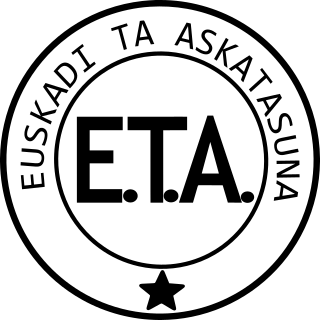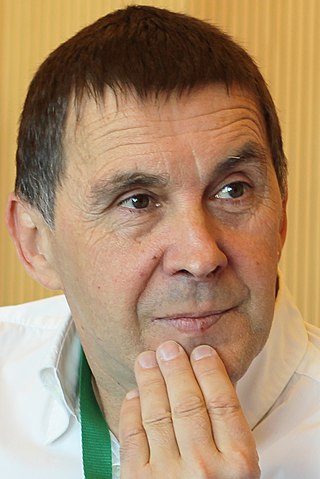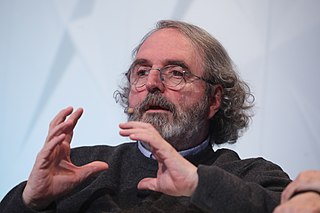Related Research Articles

ETA, an acronym for Euskadi Ta Askatasuna, was an armed Basque nationalist and far-left separatist organization in the Basque Country between 1959 and 2018, with its goal being independence for the region. The group was founded in 1959 during the era of Francoist Spain, and later evolved from a pacifist group promoting traditional Basque culture to a violent paramilitary group. It engaged in a campaign of bombings, assassinations, and kidnappings throughout Spain and especially the Southern Basque Country against the regime, which was highly centralised and hostile to the expression of non-Castilian minority identities. ETA was the main group within the Basque National Liberation Movement and was the most important Basque participant in the Basque conflict.

Basque nationalism is a form of nationalism that asserts that Basques, an ethnic group indigenous to the western Pyrenees, are a nation and promotes the political unity of the Basques, today scattered between Spain and France. Since its inception in the late 19th century, Basque nationalism has included Basque independence movements.

The Basque Nationalist Party, officially Basque National Party in English, is a Basque nationalist and regionalist political party. The party is located in the centre of the political spectrum.

The assassination of Luis Carrero Blanco, also known by its code name Operación Ogro, had far-reaching consequences within the politics of Spain. Admiral Carrero Blanco, who was also the prime minister at the time, was killed in Madrid by the Basque separatist group ETA on 20 December 1973. The assassination is considered to have been the biggest attack against the Francoist State since the end of the Spanish Civil War in 1939.

The Basque Country is the name given to the home of the Basque people. The Basque Country is located in the western Pyrenees, straddling the border between France and Spain on the coast of the Bay of Biscay. Euskal Herria is the oldest documented Basque name for the area they inhabit, dating from the 16th century.

The Basque Ball: Skin Against Stone is a 2003 Spanish documentary film written and directed by Julio Medem.

Miguel Ángel Blanco Garrido was a Spanish politician who was a councillor in Ermua in the Basque Country for the People's Party (PP). He was kidnapped and subsequently murdered by the terrorist group ETA.
Abertzale is a Basque term usually referring to people or political groups who are associated with Basque nationalism.

Arnaldo Otegi Mondragón is a Basque politician who is currently General Secretary of Basque nationalist party EH Bildu. He was member of the Basque Parliament for both Herri Batasuna and Euskal Herritarrok. He was a convicted member of the banned armed separatist group organization ETA in his early years. He was one of the key negotiators during the unsuccessful peace talks in Loiola and Geneva, in 2006.

Ermua is a town and municipality located in the province of Biscay, in the autonomous community of Basque Country, northern Spain. In 2019, Ermua had 15,880 inhabitants.
The Basque National Liberation Movement was an umbrella term that comprised all social, political and armed organizations orbiting around the ideas of the illegal armed organisation Euskadi Ta Askatasuna (ETA), proscribed internationally as a terrorist organisation.

Both the perceived nationhood of Spain, and the perceived distinctions between different parts of its territory derive from historical, geographical, linguistic, economic, political, ethnic and social factors.
¡Basta Ya! was a Spanish grassroots organization uniting individuals of various political positions against terrorism and violence, notably ETA, and against the proposal for a new Statute of Autonomy of the Basque Country released by the government of President Juan José Ibarretxe. Its principal activities were anti-terror demonstrations and protests. The ¡Basta Ya! movement was a civic initiative made up of people of differing ideologies, and welcomes any citizens willing to play an active part provided they adhere to three basic principles: defend against terrorism of any sort, regardless of origin or intensity, support all victims of terrorism or of political violence and defend the rule of law, the Spanish Constitution and the Statute of Autonomy of the Basque Country. ¡Basta Ya! was created to promote social mobilization against the perpetrators of specific kinds of violence, to support those who are suffering from them, and to demand that authorities fulfill the requirements of current legislation, respecting the rule of law. The organization believes that criticism of terrorism on moral grounds is important but not enough. Criticism on political grounds is also important, and the initiative understands such criticism to be based on certain values – such as human rights - which are common to all democrats regardless of their party affiliations or their political leanings.

Jon Juaristi Linacero is a Spanish poet, essayist and translator in Spanish and Basque, as well as a self-confessed former ETA militant. He lives in Madrid.

Gotzone Mora is a Spanish social-democratic politician. She was a member of the Basque Socialist Party till March 2008 when she was expelled from it for advocating support for the People's Party. Since 2008 she has been a member of the People's Party .

New Generations of the People's Party is the youth wing of the People's Party. It operates in all Spain and also has structures in other countries. They share the same ideological platform of the PP: a centre-right ideology and economic liberalism, according to their own organisation, reformist centre.

The Basque conflict, also known as the Spain–ETA conflict, was an armed and political conflict from 1959 to 2011 between Spain and the Basque National Liberation Movement, a group of social and political Basque organizations which sought independence from Spain and France. The movement was built around the separatist organization ETA, which had launched a campaign of attacks against Spanish administrations since 1959. ETA had been proscribed as a terrorist organization by the Spanish, British, French and American authorities at different moments. The conflict took place mostly on Spanish soil, although to a smaller degree it was also present in France, which was primarily used as a safe haven by ETA members. It was the longest running violent conflict in modern Western Europe. It has been sometimes referred to as "Europe's longest war".
José Luis López de Lacalle Arnal was a Spanish journalist and trade unionist. A columnist for El Mundo newspaper, he was killed by ETA.

Women in ETA in Francoist Spain were few in numbers, and portrayed as dangerous by the media. Euskadi Ta Askatasuna (ETA) grew out of a Basque nationalist movement with roots that pre-dated the Second Spanish Republic. When Franco seized power, the new regime cracked down on Basque nationalism, imprisoned and killed many activists and made traditional women's activism difficult to continue. Women found themselves being investigated by the new regime. Basque nationalists began to stockpile weaponry following the end of World War II. ETA was created in 1952 by students in Bilbao, creating a fissure in the Basque nationalist community by the mid-1950s. Their attitude towards women was patriarchal and informed by their conservative Roman Catholicism. There would be few women in the movement in this period.

Edurne Uriarte Bengoechea is a Spanish politician, political scientist, and sociologist. She is a member of the Spanish Congress of Deputies for the People's Party of Spain, representing The Constituency of Madrid.
References
- ↑ "About". Archived from the original on 2007-09-28. Retrieved 2006-12-13.